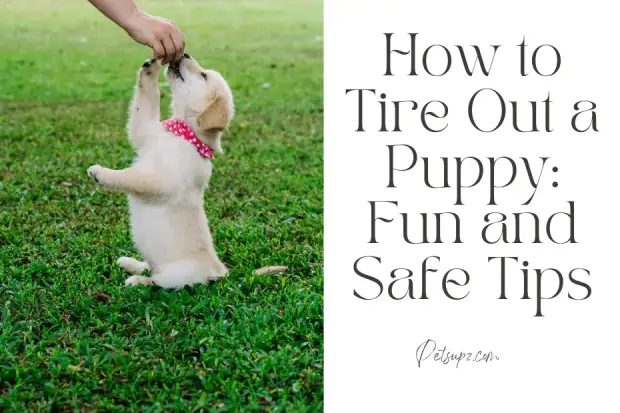Bringing home a 10 week old puppy is super exciting! But it also means you’ve got a lot to learn about caring for your new furry friend. Whether you’re a first-time puppy parent or need a refresher, this guide covers everything you need to know about your 10 week old puppy. We’ll dive into all the essentials to give your pup the best start in life.
Sleep and Daily Routine
Your 10 week old puppy might seem like a bundle of energy, but believe it or not, puppies this age need tons of sleep – we’re talking 18 to 20 hours a day! That’s because they’re growing super fast and their brains are developing at lightning speed.
Setting up a daily routine is key. Try to keep mealtimes, potty breaks, playtime, and bedtime at roughly the same times each day. This helps your pup feel secure and makes house training easier. A typical day might look like this:
- 6 AM: Wake up, potty break
- 7 AM: Breakfast, another potty break
- 9 AM: Nap time
- 11 AM: Playtime, training, potty break
- 1 PM: Lunchtime, potty break
- 3 PM: Nap time
- 5 PM: Playtime, training, potty break
- 7 PM: Dinner, potty break
- 9 PM: Last potty break
- 10 PM: Bedtime
Remember, this is just a guide. You’ll need to adjust based on your schedule and your pup’s needs.
Feeding Your 10-Week-Old Puppy
At 10 weeks, your puppy should be eating puppy food. This special food has all the nutrients they need to grow big and strong. Most pups this age do best with three meals a day, spaced out evenly.
How much should you feed? It depends on the breed and the specific food, so check the package instructions. Keep an eye on your pup’s body condition – you should be able to feel their ribs but not see them. If you’re not sure, ask your vet for advice.
Stick with the food the breeder or shelter was using at first. If you want to switch, do it slowly over a week or so to avoid tummy troubles.
Potty Training Basics
Ah, potty training. It’s not the most fun part of puppy parenting, but it’s super important. At 10 weeks, your pup can usually hold it for about 2-3 hours max during the day.
The key is consistency. Take your pup out:
- First thing in the morning
- Last thing at night
- After meals
- After naps
- During playtime
When your pup does their business outside, praise them like they’ve just won a gold medal at the Olympics! Treats are good too. Accidents will happen – when they do, clean up without fuss and remind yourself it’s all part of the learning process.
Training and Socialization
Your pup’s brain is like a sponge right now, soaking up everything. It’s the perfect time to start basic training. Keep sessions short – 5 to 10 minutes tops – and always end on a positive note.
Start with simple stuff like teaching their name, “sit,” and “come.” Use lots of praise and treats. Remember, you’re not training for the doggy Olympics here – keep it fun!
Socialization is super important too. This means safely exposing your pup to different people, animals, sounds, and experiences. The goal is to help them grow into a confident, well-adjusted adult dog. Just remember, your pup isn’t fully vaccinated yet, so avoid dog parks or areas with lots of unknown dogs.
Exercise and Play
While your pup has loads of energy in short bursts, they actually don’t need tons of exercise at this age. A good rule of thumb is 5 minutes of exercise per month of age, twice a day. So for a 10-week-old pup, that’s about 10-15 minutes, twice daily.
Mental exercise is just as important as physical exercise. Use puzzle toys, training sessions, and games like hide-and-seek to keep that puppy brain busy.
When it comes to toys, variety is the spice of life! Offer different textures and types of toys. Just make sure they’re safe – no small parts that could be swallowed.
Health and Veterinary Care
Your pup will need a series of vaccinations to protect them from nasty diseases. The exact schedule can vary, so chat with your vet about what’s best.
Regular check-ups are important too. Your vet can keep an eye on your pup’s growth, check for any health issues, and answer any questions you have.
Don’t forget about parasite prevention. Your pup will need regular deworming and flea/tick prevention. Again, your vet can advise on the best products for your pup.
Teething and Chewing
Around 10 weeks, your pup might start teething. This can be uncomfortable for them, and they might chew everything in sight to relieve the discomfort.
Provide lots of puppy-safe chew toys. Frozen washcloths or specially designed teething toys can help soothe sore gums.
Remember to puppy-proof your home. Anything within reach could become a chew toy, so keep shoes, cables, and other tempting items out of reach.
Creating a Safe Environment
Speaking of puppy-proofing, it’s crucial to make your home safe for your curious pup. Get down on their level and look for potential hazards. Some things to watch out for:
- Electrical cords
- Small objects they could swallow
- Toxic plants
- Cleaning supplies and medications
A crate or playpen can be a great way to keep your pup safe when you can’t supervise them directly. Just make sure it’s a positive space – never use it as punishment.
Grooming Basics
Even at 10 weeks old, it’s a good idea to start getting your puppy used to grooming. This includes:
- Gentle brushing: Use a soft brush and keep sessions short and positive.
- Nail trimming: Get your pup used to having their paws handled.
- Bathing: Use lukewarm water and puppy-safe shampoo. Make it a fun experience!
- Teeth cleaning: Start with just touching their mouth, then gradually introduce a puppy toothbrush and toothpaste.
Remember, the goal at this age is to create positive associations with grooming, not to achieve perfection.
FAQs
Q: How long can a 10-week-old puppy hold their bladder at night?
A: Most puppies this age need to go out once or twice during the night. They usually can’t make it through the whole night until about 4 months old.
Q: How much should a 10-week-old puppy sleep?
A: Puppies this age need about 18-20 hours of sleep per day. They’ll take lots of naps throughout the day.
Q: When can I start taking my puppy for walks?
A: Wait until your pup is fully vaccinated, usually around 16 weeks. Until then, carry them to safe areas for socialization experiences.
Q: How often should I feed my 10-week-old puppy?
A: Most puppies this age do well with three meals a day, spaced evenly throughout the day.
Conclusion
Caring for a 10-week-old puppy is a big job, but it’s also incredibly rewarding. Remember, every puppy is unique, so what works for one might not work for another. Be patient, consistent, and don’t forget to enjoy this special time – puppies grow up fast!
Focus on providing lots of love, a consistent routine, proper nutrition, and positive training experiences. Before you know it, your little pup will grow into a happy, well-adjusted adult dog.
Remember, if you’re ever unsure about your puppy’s health or behavior, don’t hesitate to reach out to your vet. They’re there to help you give your new best friend the best possible start in life.



